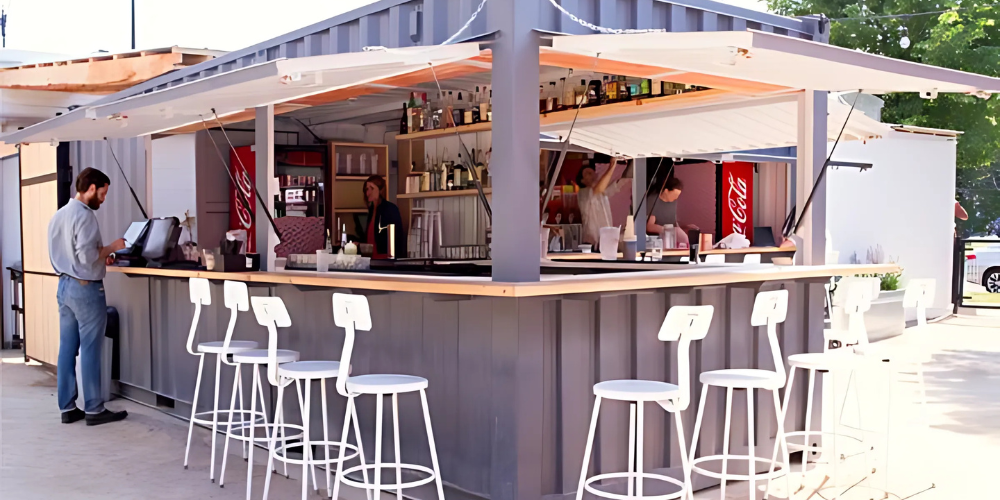
In recent years, the hospitality industry has witnessed a remarkable trend — pop-up container cafes. These unique coffee shops and eateries are taking the urban landscape by storm, transforming steel boxes into stylish, cozy, and modern dining spots. From bustling city centers to quiet suburban areas, pop-up container cafes have become a hit among entrepreneurs and customers alike. But what’s driving this surge in popularity? Let’s dig into why container-based coffee shops are on the rise.
Why Are Pop-Up Container Cafes So Popular?
Pop-up container cafes have become more than just a trend; they are a creative business solution that meets modern demands. Here’s why they are gaining traction:
1. Cost-Effective and Flexible Setup
Starting a traditional cafe requires significant investment in infrastructure, location, and permits. On the other hand, shipping container cafes offer a cost-effective alternative. Containers can be bought and modified at a fraction of the cost compared to constructing a brick-and-mortar space.
As per an article from Giant Containers, “Shipping container cafes and pop-up spaces offer a sustainable and affordable option, making them an attractive choice for start-ups and small businesses.” The affordability makes it possible for entrepreneurs to experiment with business ideas without a huge financial risk.
2. Sustainability and Green Appeal
In today’s eco-conscious world, businesses that incorporate sustainable practices are more likely to succeed. Container cafes repurpose old shipping containers that would otherwise sit unused or be scrapped. This gives them an eco-friendly edge, appealing to customers who value sustainability. Additionally, the use of reclaimed materials and energy-efficient designs further minimizes their environmental footprint.
According to BMarko Structures, “Shipping container cafes offer a second life to industrial materials while adding aesthetic value to urban landscapes.” This dual advantage of sustainability and visual appeal makes them ideal for modern businesses.
3. Mobility and Versatility
One of the standout features of container cafes is their mobility. They can be relocated easily to cater to changing market demands or event locations. This flexibility is especially useful for businesses testing new areas or wanting to participate in pop-up markets and festivals.
Moreover, their modular design means they can be stacked or expanded as needed. This adaptability allows for growth without the need to secure a larger property or pay hefty lease amounts.
Case Studies: Success Stories in Pop-Up Container Cafes
The concept of pop-up container cafes isn’t just theoretical; numerous success stories back up their potential. One notable example is Starbucks’ Container Store in Washington, established in 2011. This innovative outlet, made from four shipping containers, showcases how even major brands are embracing the trend. The success of this store not only set a precedent but also encouraged other coffee businesses to think outside the conventional setup.
Another popular example is Boxpark Shoreditch in London, where shipping containers house a variety of eateries and shops. These compact and stylish units make efficient use of space while drawing in curious visitors who enjoy the unique ambiance.
One of the container suppliers that has made waves in the industry is ContainersX, known for offering high-quality shipping containers for sale that are perfect for building trendy and sustainable pop-up cafes. By providing durable and versatile containers, ContainersX helps aspiring entrepreneurs kickstart their unique coffee ventures.
Economic and Community Benefits
Pop-up container cafes aren’t just good for business owners; they benefit local communities too. By occupying underutilized spaces, these cafes breathe new life into neglected areas. They attract foot traffic, encourage social interactions, and create jobs — all while revitalizing neighborhoods.
Furthermore, the low cost of setup lowers the barrier to entry, allowing small business owners from diverse backgrounds to step into the food and beverage industry. This democratization of entrepreneurship fosters innovation and cultural diversity in the hospitality scene.
Challenges and Considerations
While pop-up container cafes offer a myriad of advantages, they come with challenges. One significant hurdle is meeting local regulations regarding zoning and safety. Some cities may impose strict building codes, making it necessary to navigate bureaucratic obstacles. Additionally, container cafes may face resistance from consumers who perceive them as temporary or less reliable compared to permanent establishments.
However, with the right approach and thorough planning, these challenges can be managed effectively. Entrepreneurs who invest in proper insulation, ventilation, and aesthetic upgrades often find that customers quickly warm up to the concept.
Future of Pop-Up Container Cafes
The future looks bright for pop-up container cafes as urban planners and architects continue to recognize their potential. As cities become more crowded and rental costs soar, the appeal of mobile, modular, and affordable cafe setups will only increase. Innovations in sustainable design, such as solar panels and energy-efficient insulation, are expected to make these cafes even more eco-friendly and practical.
Moreover, as consumers continue to support businesses that align with environmental values, pop-up container cafes are poised to remain relevant and sought-after. For entrepreneurs looking to enter the cafe business, investing in container-based setups might just be the winning formula.
Conclusion
Pop-up container cafes have undoubtedly carved a niche in the coffee and dining industry. With their cost efficiency, sustainable appeal, and versatility, they offer a unique solution for modern entrepreneurs. Whether in a bustling city or a quiet neighborhood, these cafes serve as a testament to how creative thinking and practical solutions can transform the hospitality landscape.
For those considering this venture, exploring shipping containers for sale can be the first step toward launching a trendy and sustainable coffee business. As more businesses and customers embrace this concept, pop-up container cafes will continue to thrive as symbols of innovation and community spirit.















